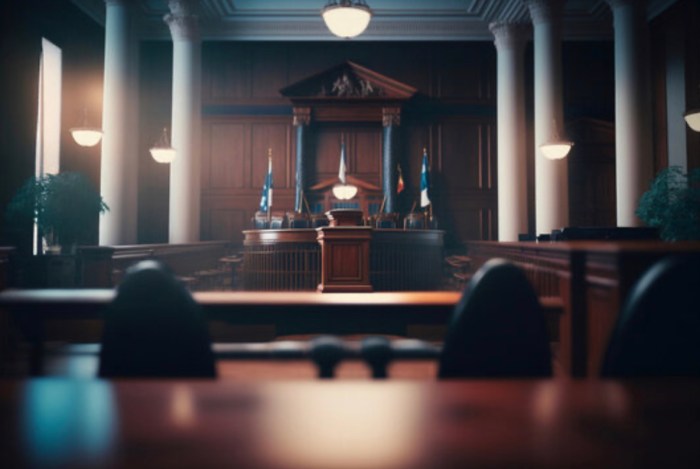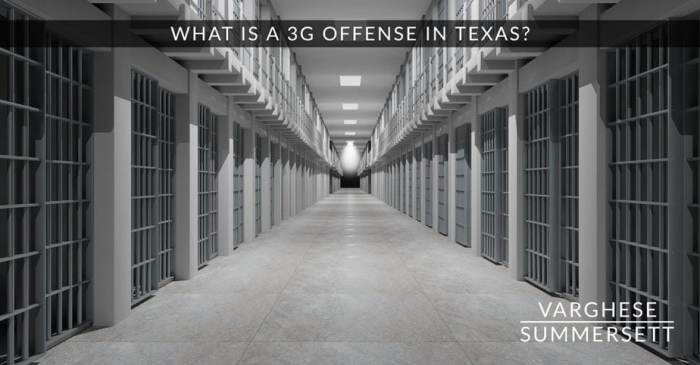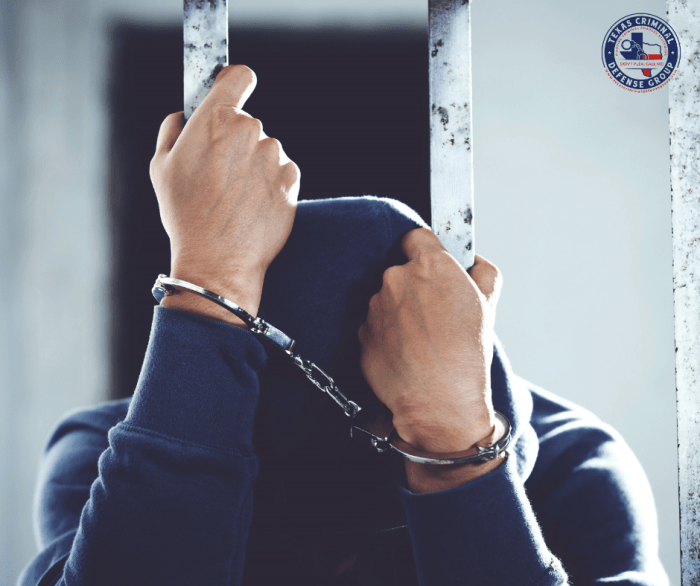What are 3G offenses in Texas? Dive into this comprehensive guide to unravel the complexities of these offenses, their legal implications, and potential defenses. From understanding the definition to navigating sentencing guidelines, we’ll delve into everything you need to know.
In the realm of Texas criminal law, 3G offenses occupy a distinct category, carrying significant consequences. As we embark on this legal exploration, we’ll dissect the elements of these offenses, their classification, and the potential impact on individuals facing such charges.
3G Offenses in Texas

In the state of Texas, 3G offenses are considered serious and carry significant legal consequences. The term “3G” refers to three specific types of offenses: gang-related activity, graffiti, and criminal trespass. These offenses are treated with heightened severity due to their potential to disrupt public safety and order.
Gang-Related Activity
Gang-related activity encompasses a wide range of offenses committed by individuals who are affiliated with or involved in criminal street gangs. These offenses may include:
- Engaging in gang activity that threatens or intimidates others
- Recruiting or soliciting new members for a gang
- Conspiring to commit gang-related crimes
Graffiti
Graffiti is defined as the unauthorized marking or defacing of property with paint, ink, or other materials. In Texas, graffiti is considered a 3G offense if it is:
- Committed on public property
- Done with the intent to damage or deface the property
- Likely to cause emotional distress to others
Criminal Trespass
Criminal trespass occurs when an individual enters or remains on property without the consent of the owner or person in lawful possession. In Texas, criminal trespass is considered a 3G offense if it is:
- Committed on a school campus
- Involves a dwelling or habitation
- Done with the intent to commit another crime
The legal consequences of committing a 3G offense in Texas can be severe. Individuals convicted of these offenses may face:
- Enhanced penalties, including increased fines and jail time
- Restrictions on probation and parole
- Deportation for non-citizens
It is important to note that the specific penalties for 3G offenses vary depending on the nature of the offense and the offender’s criminal history. If you are facing charges for a 3G offense in Texas, it is crucial to seek legal advice from an experienced criminal defense attorney.
Classification of 3G Offenses

In Texas, 3G offenses are classified into different categories based on the severity of the crime and the potential impact on the victim and society. The classification of offenses as 3G is determined by specific criteria set forth in the Texas Penal Code.
Felony Offenses
Felony offenses are the most serious category of 3G offenses and typically involve violent crimes, drug trafficking, and other high-level offenses. Felony offenses are punishable by imprisonment in a state prison for a term of more than one year.
Class A Misdemeanors
Class A misdemeanors are less serious than felonies but still carry significant penalties. These offenses often involve theft, assault, and other crimes that pose a threat to public safety. Class A misdemeanors are punishable by imprisonment in a county jail for up to one year.
Class B Misdemeanors
Class B misdemeanors are the least serious category of 3G offenses and typically involve minor crimes such as disorderly conduct, trespassing, and traffic violations. Class B misdemeanors are punishable by a fine of up to $2,000 and/or imprisonment in a county jail for up to 180 days.
The classification of an offense as a 3G offense has a significant impact on sentencing. Felony offenses carry the most severe penalties, while Class B misdemeanors carry the least severe penalties. The specific penalties for each offense will vary depending on the circumstances of the case and the offender’s criminal history.
Sentencing for 3G Offenses

Sentencing for 3G offenses in Texas is determined by several factors, including the severity of the offense, the defendant’s criminal history, and the presence of any aggravating or mitigating circumstances.
In Texas, 3g offenses refer to certain drug-related crimes. These can include possession of a controlled substance, such as marijuana or cocaine. For a deeper dive into historical events, check out the unit 7 ap world history test . Coming back to 3g offenses, they carry specific penalties depending on the type and amount of drug involved.
The sentencing ranges for 3G offenses are as follows:
- Felony of the third degree:2-10 years in prison and/or a fine of up to $10,000.
- Class A misdemeanor:Up to 1 year in jail and/or a fine of up to $4,000.
- Class B misdemeanor:Up to 180 days in jail and/or a fine of up to $2,000.
Factors Considered in Sentencing
When determining the appropriate sentence for a 3G offense, the court will consider the following factors:
- The severity of the offense
- The defendant’s criminal history
- The presence of any aggravating or mitigating circumstances
- The defendant’s age and mental health
- The impact of the offense on the victim
Enhanced Penalties for Repeat Offenders
Repeat offenders may be subject to enhanced penalties for 3G offenses. For example, a defendant who has been previously convicted of a felony may be sentenced to a longer prison term for a subsequent 3G offense.
Defenses to 3G Offenses

Defenses to 3G offenses aim to challenge the prosecution’s case or mitigate the charges. These defenses rely on legal arguments and supporting evidence to establish a reasonable doubt or reduce the severity of the offense.
Lack of Intent
The prosecution must prove that the defendant acted intentionally or knowingly when committing the offense. If the defendant can demonstrate a lack of intent or knowledge, they may be acquitted or have their charges reduced. This defense often involves presenting evidence of mistake, intoxication, or diminished capacity.
Self-Defense or Defense of Others
In certain situations, a defendant may use force to protect themselves or others from imminent harm. This defense requires the defendant to prove that the force used was reasonable and necessary to prevent harm.
Intoxication
Intoxication can be a defense to 3G offenses if it impairs the defendant’s ability to form the requisite intent or understand the consequences of their actions. However, intoxication is not a complete defense and may only reduce the severity of the charges.
Insanity
The insanity defense is rarely successful but can be used to argue that the defendant was mentally ill at the time of the offense and unable to appreciate the wrongfulness of their actions.
Duress or Coercion
If the defendant was forced or coerced into committing the offense by threats of violence or other unlawful means, they may have a defense of duress or coercion.
Statute of Limitations
The statute of limitations sets a time limit within which charges must be filed. If the prosecution fails to file charges within this time frame, the defendant may be immune from prosecution.The effectiveness of these defenses depends on the specific facts of the case and the strength of the evidence presented.
A skilled criminal defense attorney can help the defendant navigate the legal complexities and develop a robust defense strategy.
Legal Implications of 3G Offenses

A 3G offense conviction can have severe legal repercussions that extend beyond the immediate sentencing. These implications can impact various aspects of an individual’s life, including employment, housing, and personal rights.
-
Employment
A 3G offense conviction can create barriers to employment, as many employers conduct background checks. Depending on the nature of the offense, it may disqualify individuals from working in certain fields or positions that require security clearances or public trust.
-
Housing
3G offense convictions can also affect housing options. Landlords may be hesitant to rent to individuals with a criminal history, particularly if the offense involves violence or property damage. This can limit access to safe and affordable housing.
-
Collateral Consequences, What are 3g offenses in texas
3G offense convictions can trigger collateral consequences, such as loss of voting rights, ineligibility for certain government benefits, and potential deportation for non-citizens. These consequences can further compound the challenges faced by individuals with a criminal record.
Mitigating the legal implications of a 3G offense conviction requires proactive steps. Individuals should seek legal advice to understand their rights and explore options for expungement or record sealing. Additionally, rehabilitation programs, community service, and education can demonstrate a commitment to change and reduce the negative impact of the conviction.
FAQ Section: What Are 3g Offenses In Texas
What constitutes a 3G offense in Texas?
3G offenses in Texas are serious felonies that carry significant penalties. They include offenses such as aggravated robbery, aggravated assault, and burglary of a habitation.
How are 3G offenses classified?
3G offenses are classified based on their severity and potential harm to society. They are typically divided into three categories: first-degree, second-degree, and third-degree offenses.
What are the potential penalties for 3G offenses?
The penalties for 3G offenses vary depending on the degree of the offense. First-degree offenses carry the most severe penalties, including life imprisonment or the death penalty.
Are there any defenses to 3G offenses?
Yes, there are several potential defenses to 3G offenses, including self-defense, lack of intent, and insufficient evidence. The specific defenses available will depend on the circumstances of the case.